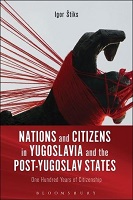Chapter 8 Enemies
Citizenship as a Trigger of Violence
| dc.contributor.author | Štiks, Igor | |
| dc.date.accessioned | 2018-08-08 11:47:17 | |
| dc.date.accessioned | 2020-04-01T13:09:15Z | |
| dc.date.available | 2020-04-01T13:09:15Z | |
| dc.date.issued | 2015 | |
| dc.identifier | 642979 | |
| dc.identifier | OCN: 1030816397 | en_US |
| dc.identifier.uri | http://library.oapen.org/handle/20.500.12657/30750 | |
| dc.description.abstract | Chapter 8 shows the connection between a certain vision of citizenship – in this context, ethnonationally defined – and violence, and how citizenship is crucial though under-researched trigger of violence. To examine why and how this violence happened, and what was the role of citizenship, the chapter examines the whole post-socialist post-partition European states. It argues that the fate of many citizens of the former socialist federations in the context of their imminent disintegration was determined by their answers to the following questions: Did the incipient states (republics) and the federal centre accept the separation and the existing borders? Did all groups and all regions accept independence and the authorities of the new states? The analysis of the possible answers to these questions across post-socialist Europe brings us to three decisive triggers of violence: citizenship, borders and territories, and, finally in the early 1990s, the role of the military apparatus of defunct federations. One could safely conclude that there is an intimate historic affinity between citizenship and war. From the antique city-states where full citizenship status was acquired by serving in war (Anderson 1996: 28, 33; Pocock 1998), via the traditional military draft for men (and in some places for women) to contemporary practices that enable immigrants and foreigners serving in the armed forces, such as the US army or in the Légion étrangère, an easier access to citizenship. There is a historic relationship between ‘blood’, either inherited or spilled (one’s own or of other people), and citizenship. However, violence related to citizenship is not only physical but often invisible. It is the violence of administrative decisions, hierarchy of different statuses, ‘wrong’ passports and ‘papers’ or deprivations of citizenship. In the following chapter, I will also tackle the issue of physically invisible but nonetheless effective violence caused by the post-Yugoslav citizenship regimes. In this chapter though, I will turn to the outbreak of that ‘visible’ violence that spread across almost all corners of the former Yugoslavia. To examine why and how this violence happened, and what was the role of citizenship, we need to cast the net more widely all over post-socialist post-partition European states. | |
| dc.language | English | |
| dc.subject.classification | thema EDItEUR::J Society and Social Sciences | en_US |
| dc.subject.classification | thema EDItEUR::J Society and Social Sciences::JP Politics and government | en_US |
| dc.subject.other | citizenship | |
| dc.subject.other | post-socialist europe | |
| dc.subject.other | violence | |
| dc.subject.other | borders | |
| dc.subject.other | 1989 | |
| dc.subject.other | territories | |
| dc.subject.other | disintegration | |
| dc.subject.other | ethnic conflicts | |
| dc.subject.other | federal armies | |
| dc.subject.other | citizenship | |
| dc.subject.other | post-socialist europe | |
| dc.subject.other | violence | |
| dc.subject.other | borders | |
| dc.subject.other | 1989 | |
| dc.subject.other | territories | |
| dc.subject.other | disintegration | |
| dc.subject.other | ethnic conflicts | |
| dc.subject.other | federal armies | |
| dc.subject.other | Croatia | |
| dc.subject.other | Kosovo | |
| dc.subject.other | Russia | |
| dc.subject.other | Serbia | |
| dc.subject.other | Serbia and Montenegro | |
| dc.subject.other | Serbs | |
| dc.subject.other | Serbs of Bosnia and Herzegovina | |
| dc.subject.other | Transnistria | |
| dc.subject.other | Yugoslav People's Army | |
| dc.title | Chapter 8 Enemies | |
| dc.title.alternative | Citizenship as a Trigger of Violence | |
| dc.type | chapter | |
| oapen.identifier.doi | 10.5040/9781474221559.ch-009 | |
| oapen.relation.isPublishedBy | 066d8288-86e4-4745-ad2c-4fa54a6b9b7b | |
| oapen.relation.isPartOfBook | 652c73a7-2e3d-4da9-8af8-4cde5d8e61a4 | |
| oapen.relation.isFundedBy | FP7 Ideas: European Research Council | |
| oapen.collection | European Research Council (ERC) | |
| oapen.pages | 133-148 | |
| oapen.pages | 15 | |
| oapen.place.publication | London | |
| oapen.chapternumber | 9 | |
| oapen.grant.number | 230239 | |
| oapen.grant.acronym | CITSEE | |
| oapen.grant.program | FP7 | |
| oapen.remark.public | Relevant Wikipedia pages: Croatia - https://en.wikipedia.org/wiki/Croatia; Kosovo - https://en.wikipedia.org/wiki/Kosovo; Russia - https://en.wikipedia.org/wiki/Russia; Serbia - https://en.wikipedia.org/wiki/Serbia; Serbia and Montenegro - https://en.wikipedia.org/wiki/Serbia_and_Montenegro; Serbs - https://en.wikipedia.org/wiki/Serbs; Serbs of Bosnia and Herzegovina - https://en.wikipedia.org/wiki/Serbs_of_Bosnia_and_Herzegovina; Socialist Federal Republic of Yugoslavia - https://en.wikipedia.org/wiki/Socialist_Federal_Republic_of_Yugoslavia; Transnistria - https://en.wikipedia.org/wiki/Transnistria; Yugoslav People's Army - https://en.wikipedia.org/wiki/Yugoslav_People%27s_Army | |
| oapen.identifier.ocn | 1030816397 |

